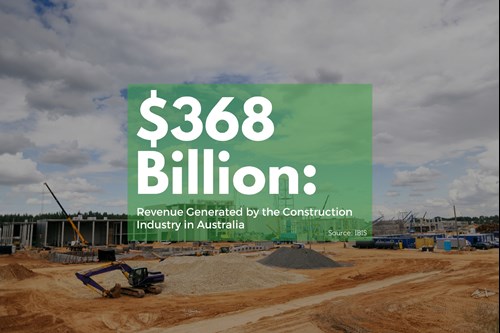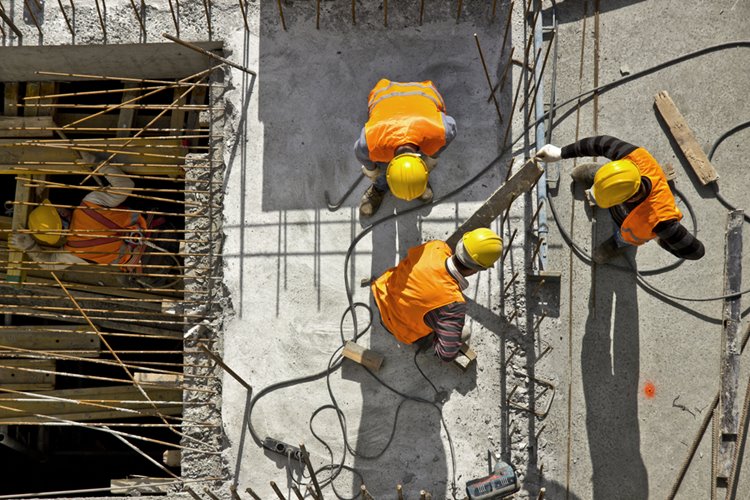Building and construction industry profile

The population of Australia is currently growing at a rate of 1.4%; this might not sound like much but it represents an additional 327,600 people who last year added to Australia’s housing, infrastructure and business premises requirements.
This rate of growth means that Australia has requirements for an expanding workforce in the building and construction industries. This industry sector is one of Australia’s largest, employs over 1,000,000 workers and generates revenue of over $368 billion. This is a great time to either move into a career in building and construction or to consolidate your experience through recognised qualifications. In a growth industry, opportunities for advancement and achievement abound for those who are prepared to push themselves.
One simple measure of skills requirements is to look at the Department of Employment Skill Shortage List, which lists occupations into which the government is hoping to recruit from overseas. This includes (December 2016) construction project managers, surveyors, bricklayers, carpenters, joiners, plasterers and plumbers. However the range of employment opportunities within this sector is wide and there is current demand in all areas including:
Construction Labour
A labourer’s job is to support a more skilled trades person. By completing certain lesser skilled tasks, a good labourer will speed up a trades person's work. This is an excellent entry-level position and a great opportunity to pick up useful skills. Many labourers choose to undertake formal qualifications at this stage.
Typically a labourer might be asked to: organise equipment, dig holes, prepare sites, undertake demolitions, mix and lay concrete, operate tools and move materials. These tasks will initially be done under supervision. As well as more practical tasks, a labourer will be expected to have an understanding of health and safety guidelines and follow these to the letter.
Career Opportunities
Most skilled trades persons require a labourer. This would include: plumbers, builders, bricklayers, carpenters and joiners. Sometimes jobs are advertised for ‘site’ or ‘general’ labourers. If you have a trade in which you are specifically interested, look for a labouring job in that area. If you are unsure, find a more general position.
Key Skills
The most important skill for a labourer is the ability to understand and follow instructions. Supervision is not always direct so being able to think and work independently is also important. Most of the work will be outside and heavy so a good level of physical fitness will be required. A generally practical approach would be an asset as well as an attention to detail. All labourers must be capable of following health and safety instructions.
.jpg)
Construction Management
Construction projects are often complicated and require a number of different skilled people to work together. Without excellent management a project risks failure or increased costs. A construction manager organises the human resources (i.e. the workforce) and the physical resources (i.e. equipment and materials) for a project. He or she also takes part in the planning of a construction project.
Construction management is a skilled and complicated job and requires experience and additional training. Daily tasks for a construction manager might include: reading and understanding blueprints, submitting plans, checking adherence to laws and codes (including health and safety regulations), coordinating skilled tradesmen and labourers, organising the delivery of heavy equipment, deciding when to use sub-contractors and bidding on projects.
Career Opportunities
- Construction project management (planning and overseeing whole and often large building projects)
- Construction supervision (overseeing an element of a project)
- Construction foreman (in charge of a group of construction workers)
Key Skills
Construction managers need to be able to make important decisions quickly and accurately. They work to tight deadlines in sometimes-difficult physical conditions and must understand how to handle stress. People skills are vital, as a manager will have to communicate and maintain relationships with a range of stakeholders including: labourers, skilled tradespersons, building inspectors, clients and planners. A construction manager will need to perform several tasks at once and organisational skills will be key. Mathematics and a sound knowledge of the building and construction industry are also necessary.

Surveying
Surveyors take exact measurements and collect data about land and prospective building projects. They also establish important information about boundaries, deeds and leases and carry out feasibility studies for building projects. A surveyor will understand how to organise and present all of this information using charts, graphs and reports. Surveyors use GPS (Global Positioning System) and GIS (Geographic Information System) technology. Their findings will inform construction and building planning. Surveyors also work with historical building conservation, environmental impact and planning applications.
A surveyor will sometimes work in an office but will often be outside and may need to carry equipment. Surveying is a technical job that requires qualifications at all levels.
Career Opportunities
- Quantity surveying (managing construction project costs)
- Land surveying (measuring the land shape and gathering data)
- Building surveying (advising clients about design, construction and repair)
- Civil engineering (design, construction and research work on building projects)
Key Skills
Surveyors need science, maths and engineering skills; they also require a certain level of technical competence. Accuracy is important in a surveyor’s job, as is the ability to clearly and concisely present information. A surveyor will be required to communicate with team members, clients, construction managers and government officials. A good level of physical fitness will be required because much surveying work is outside and may be on rough terrain. Surveyors need to have problem-solving skills as they have to make decisions based on a wide range of information.

Building Design
A building designer has the skills, training and expertise to design buildings or additions to buildings. Once known as ‘draftsmen’, building designers are similar to architects but generally have a vocational qualification instead and work on smaller scale buildings. A building designer will understand how to comply with building and planning regulations and will work before, during and after a project to ensure that these are adhered to.
The building designer will ascertain client requirements, including budgetary requirements; they will then look carefully at the design brief and the site constraints before producing detailed drawings and specifications to be used to apply for approvals, show to clients and inform construction workers. During and after construction the building designer will work closely with the construction team.
Career Opportunities
- Urban planning (design of towns and cities including transport, communications and buildings)
- Property development (developing buildings and land to suit society requirements)
- Conservation (working to simultaneously improve and preserve older buildings)
Key Skills
The qualifications required to be a building designer in Australia vary from state to state; a building designer has to have a qualification at vocational or tertiary level. Building design requires a combination of creative flair and practical knowledge. A building designer will need to be able to understand client ideas and reproduce or enhance them; this will require excellent listening and communication skills. Analytical skills and specific knowledge are required to ensure the success of the practical side of building design.
The building and construction industry offers an exciting and diverse range of opportunities. Get started in your chosen area and who knows how you could end up influencing Australia’s development!


)
)

